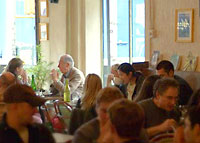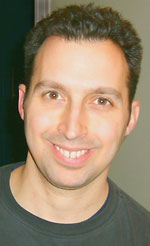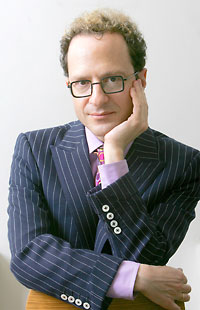

JACKET INTERVIEW
Wayne Koestenbaum
in conversation with Tony Leuzzi
22 October 2004, Le Gamin Coffee Shop, Chelsea, New York.
This Le Gamin (on the corner of 9th Avenue and 21st; there are others with the same name) has since changed management and is called Cafe Grainne.
This piece is about 10 printed pages long
WK: Concretely, it was because I was reading Kenneth Koch and he had written poems in ottava rima and they were deliciously flat and self-deprecating and mock-epic. I thought, “Oh, I could do this.” I rhymed a lot in my first book, Ode to Anna Moffo, but I had since abandoned rhyme and meter and I missed it.

Le Grainne Cafe, exterior
Interesting. I’ve never read Hudibras. I took an eighteenth-century literature class as an undergrad and it was my least-favorite period of literature. I almost had an allergy against it. I never really got into it.
That’s possible. But I’d read Byron in graduate school and liked the figure of Byron more than his poetry. I didn’t read Don Juan when I was writing this and I kept on thinking I should to get tips, but I didn’t. I hadn’t looked at that poem in years, so the Byronic influence is more systemic, more influenced by the image of Byron.
I used the form as an arbitrary module. I could put anything I want inside of it. I make reference, for instance, to Andy Warhol’s Brillo boxes.
Right. Yes.
Yes. I’m someone who doesn’t take himself that seriously. I mean the book itself is serious insofar as it was hard to write and I had to commit a lot of time it. I had to believe in it and had to think I could get away with it. I had to work hard, but the work is not serious in that it doesn’t strive for a lofty tone. I just accept the fact that I’m a prosaic poet who says what he needs to say.

Le Grainne Cafe, interior
I could have been even more self-deprecating. There’s a kind of a Woody Allen shtick. I do undercut myself a lot. I suppose deep down I do have a grand image of myself that I apologize for in my writing, even in conversation. I tend to make very bold statements in life. But then I retract them or doubt them. I’ve always been a little bit of an underdog. Growing up I was the shortest kid in my class. I have an older brother. I also never felt very much like a legitimate poet.
(Laughs).
That’s totally my aesthetic. I’m a very sexually-preoccupied person. Sexuality has always been a place for me of retreat and richness and fantasy. If there is something I take very seriously it’s sex. I take it seriously the way Genet does or the Marquis de Sade. I don’t consider it low on the totem pole. For instance, consider Clinton’s affair with Monica Lewinsky. In my mind he was not in the least discredited by that adventure. If anything he was elevated. And so I am familiar with reversing the cultural hierarchy that puts at the bottom the realm of sleaze and puts at the top family values, religion, and institutions. I take seriously the shadow side of sexual conduct.
And it’s fairly obvious that the stanza and form is a stricture against which one must battle to find freedom. But also I’m in a constant productive war with the forms of domesticity, family, and sexuality. I want to fit in the container but I also don’t want to fit in the container.
Yes. Sexuality is the key here. I would have put more material relating to this in the book if I had the courage.
It has an improvisational quality. The book started as an exercise for myself. I wrote the warm-up, which appears before the “First Canto.” I was so happy to do this. I hadn’t had so much fun in years. I thought, “I’m going to write until I run out of inspiration.” I wrote much of it in August, which is the best month of writing for me because I go back to teaching in September and I’ve had a little leisure in the previous summer months, a kind of inner-fertilization period. I hit this August stride. Actually, it was in July. No, I wrote it in July. I started to revise the book in August. This is how I do most of my writing. I go with an impulse until it dies. And don’t give up. I get kind of obsessed and manic and work daily on the process and just keep going until I run out. It’s really hard to do. Since I wrote each of those cantos in a day, it was very hard to sustain it. I kept saying to myself “Don’t stop until you get to a satisfying number.” It was nine, but I completed fourteen or fifteen cantos and condensed them into twelve.
It did ultimately –– and this is the sad thing about spontaneity –– take several years. I wrote it that summer, spent a couple of months revising it, and then I showed it to a number of poet friends who told me the rhymes weren’t working. The original had much more approximate rhymes in it. Very approximate. Then I went back and reworked it. This process took me a year to make the rhymes as exact as I could and make the meter as exact as I could. This was Hell. By the time I had finished rewriting it, any memory of the original pleasure it had given me was gone.
Yes. Some of the stanzas are more managed within the unit and come to a kind of epiphany.
Yes, exactly.
It was spontaneous. Why I like to write poetry is that such connections are actually happening. Why I need to write quickly in my first drafts is so I don’t stop myself before I make that leap. That’s the way I write in general. I write a lot at once. And, again, I am somewhat of a prosaic writer. Anecdotes one, two, and three in themselves aren’t necessarily interesting, but it’s the travel through them –– in or before –– that proves exciting. I need to pursue the course of the narrative all the way through to the end because, ideally, that process will redeem the journey. And that’s why I am excited by a form like this that will enable me to go on and on and on. I know my writing will get better if I continue. If I stop I’m in trouble.
Yes. I like size, too. I like big, long poems, too.
I also like micro units. Another manuscript I have in the works is all short poems. Originally, this book had thirty pages of short poems attached to this long poem but Thom Ward [ BOA Editor] did not want to print them with the long ottava rima poem.
In terms of not taking myself too seriously, I would never have submitted this long poem as a book by itself.
I don’t have enough clout as a poet to try to publish a book like this. I thought if the thirty pages of other poems were included someone who didn’t like MH might like the shorter poems better.
Yes. And several of my readers of the original manuscript liked the shorter poems much better than MH, which they felt was verbose, shticky, formally self-referential hay ride. I would love to try this sort of thing again. Maybe rime royal, which a friend told me is easier than ottava rima. Auden’s “Letter to Lord Byron” is in that form. Rhyme comes in a funny way very naturally to me because of my free-associative bents and because my syntax is somewhat unruly.
I agree, but it’s funny: the poetry world is so faction-driven, so sectarian, that there are people who won’t read MH. I mean there are whole classes of readers, writers, and scholars I admire who won’t read this book because it is in form and is written in the first person.
Yes, and I find such reactions painful. I can read L-A-N-G-U-A-G-E poets, Beats, real wild street poets, James Merrill. I can take pleasure in the whole range. And what pains me more than those who won’t read MH because it’s in form are those who would dismiss its seriousness or rigor because it is confessional. That really depresses me because there is no way I can write without making constant reference to my own life or my own so-called life. I guess that’s just the way I’m built as a writer. One press turned the book down because it was in form. They only took “experimental” work. Another press said “we don’t do confessional stuff.” Before this experience, I had no idea I was a formalist or a confessional poet.
Aren’t “Formalist” and “Confessional” dead terms anyway?
Yes, she’s big in the book.
It’s pretty literal. If it’s intercepting the cultural stereotype you mention it’s because that cultural stereotype is somewhat true. It’s a powerful subject that I haven’t really wanted to write about before. I always felt it was one of my major subjects but I’ve written about it in disguised form. One of the major personal breakthroughs of writing in this form is I finally found a place to write about my mother with the right tone. When I tried to write about her in the past it was too serious, too memoir-ish. It seemed inaccurate. I felt comfortable writing about her in this form because I could be a comical and honest at the same time.
I think my writing about her in MH is stylized. It emphasizes certain details over other ones. Likewise, the portrait of my boyfriend in the work is very partial.
Yes. I never once decided, “I’m going to have a stanza about excrement.” It was the last thing I thought would come up. It was one of the stanzas I considered cutting for embarrassment reasons. But I liked how the rhymes happened and how they were true. If I’m saying something true and I’m saying it in my own voice and it fits well within the rhymes, it seems like such a life discovery that I couldn’t omit it. I did cut a few things. I had my boyfriend read a few stanzas and he said “You can’t say that.” But he let me put the section in that we’re discussing.
Such topics never bore me. I love the foregrounding of the writing process and the inclusion of material that reveals that the writing is happening. My favorite fiction writer at the moment is Thomas Bernhard whose books are all about that kind of struggle. One of my favorite books of his is about a character who is trying to write a study of the composer Mendelsohn but can’t begin. I like writer’s block books.
Right. And I didn’t know how to do this book another way. The meta-writing sections are as necessary as those sections about my mother and boyfriend. Also, a writer is an uneven thing. A book is only fixable to a point. There is a lot of fixing one could do, and the things I didn’t like I was able to change or cut. But in many places, there was no way I could omit sections that were on their way to the good parts. Nonetheless, there are certain kinds of unevenness I wouldn’t allow. I wrestled with the lines that seemed profoundly un-idiomatic or where the rhymes were non-existent. I was going to try and keep the form and really try to sound like myself.
And one of the rules was it was perfectly fine to talk about the poem in the poem, that was one of the major subjects. I’m allowed to talk about what I’m eating, fantasizing about, my background, and the writer of the poem. These are all allowed topics. One of my friends who read it resisted the food. I felt the food was too deeply worked into the poem to take out. It was also one of the rules I could talk about the food. I know food talk isn’t always the stuff of profundity.
I love this place. It’s two blocks from my home. I come here all the time. I do a lot of writing here at a corner table. It feels kind of like home, which is nice to feel in a city as impersonal as New York.
Poetry readers won’t read confession. Nonfiction readers won’t read poetry. I’ve discovered this with all my books of poetry. It’s a totally different world. People who think they love me and my writing can care less that I’m publishing a book of poetry. They may pretend to care but I can see their eyes glaze over when they ask what I am working on and I say I’m publishing a long poem. They’ll smile and ask “What else?”
That’s a great question, and maybe a depressing one. Is there an audience? You’re the audience! Readers of contemporary poetry who are interested in autobiographical poetry and don’t dismiss it as un-serious. Readers of my work in other forms. Readers who have followed my work and are interested in my life and want to hear what I have to say. I think to read this book you have to be into poetry. People tell me this book isn’t too hard to read. It moves and it’s chatty. Compared to a lot of the things I’ve written it’s easy to read. So I hope that people who might be suspicious of poetry would be attracted by the book’s easiness.
Honestly, it comes as a total surprise that you see obscure references. All of that material is so familiar to me. I don’t doubt, however, that you’re correct.
I’m very committed to my cultural references. They’re as real to me as the smell of a rose. I couldn’t write if I didn’t have my cultural references.
That’s amazing. One of my friends taught one of my earlier books to a class of bright undergraduates. She told me they stopped at all the references, which shocked her and it shocked me. To some extent I think the difficulty young readers might have with these references could be a sub-cultural issue. A lot of the work I like is similarly filled with a mix of high and low references. Frank O’Hara, who’s my God, uses references all over the place.
Oh, no! You have your work cut out for you. You shouldn’t be allowed to vote if you don’t know what a fascist is.
Yes, and in my work, like Schulyer’s and Ashberry’s, there’s an assumption of an urban reader –– as opposed to other kinds of poetry that deal more explicitly with universals. I’m dealing with musical terms, brands, names, the clutter of the city. Even though I don’t think of myself as an academic, I have been in academia all my life. Compared to my colleagues, I think I use some pretty trashy references.
I once had an idea in graduate school about writing a novel that would be all one footnote, a personal footnote to the sentence “Anna Moffo was born in Wayne, Pennsylvania.” The whole novel would be the footnote to that fact. In a way, that is the book I keep trying to write.
An obvious thing: A poem or any other creative project is so personal and the writer/artist knows in a way the least about it. And the shock of it going out in the world is really miraculous and somewhat unsettling. I’m not the expert on this poem. It was a room in my house, a private space for rumination and daily work, but it’s so much more. Now it’s out there, this thing, this material that has a concrete, limited existence. But for so many years it was my fantasy. If I hadn’t published it, the book would still be my fantasy. Even though it’s out there it’s still an internal part of me. It’s the keeper of my inner world. It’s still an imaginary entity.
Most of the times writers are working very privately. They’re not really that clear that what they’re working on will get published. So when MH was published I thought “Wow, this one actually made it out into the world.”
| |

|
|
| |
|

|